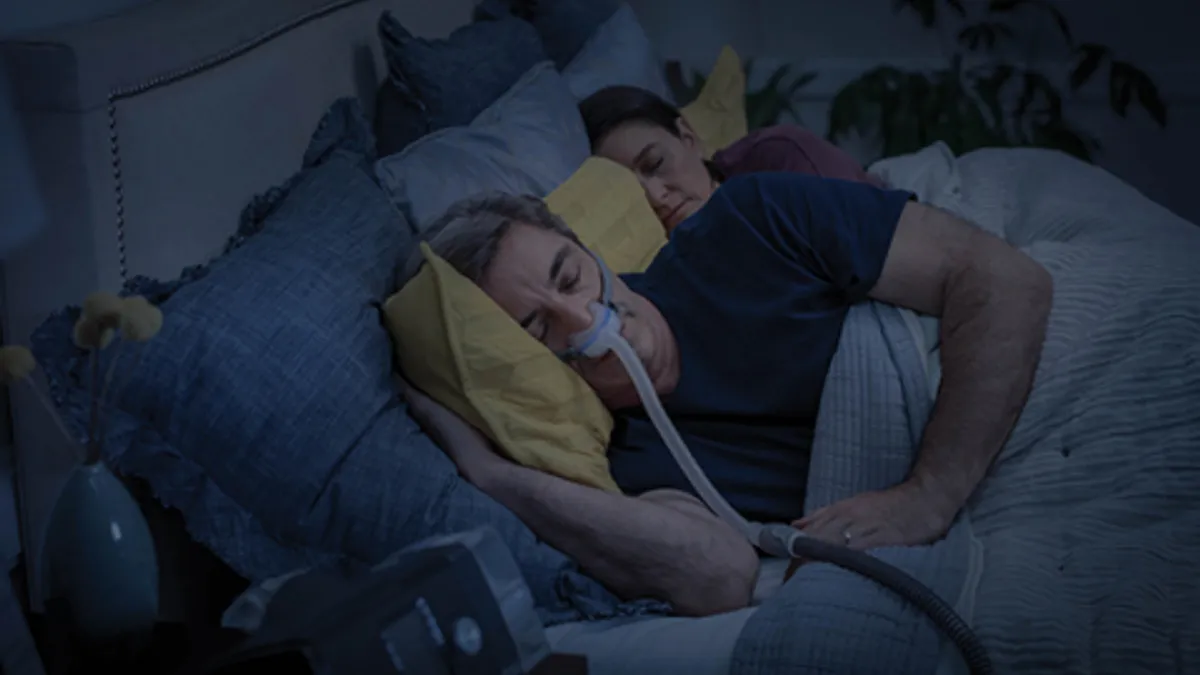Dive Brief:
- A ResMed-supported analysis of a French insurance database presented at this week's European Respiratory Society (ERS) International Congress concludes obstructive sleep apnea patients treated with continuous positive airway pressure therapy were 39% more likely to survive than patients who didn't. The study is not yet published or peer reviewed.
- The review comes several months after an HHS agency's review of 47 studies cast doubt on CPAP efficacy evidence. The Agency for Healthcare Research and Quality concluded that available evidence "mostly does not support" a link between CPAP therapy and long-term, clinically important outcomes for obstructive sleep apnea.
- The government's final report, due by the end of the year, could have major implications for big players in the space like Philips and ResMed. Jefferies analysts noted that CMS triggered the AHRQ review and "seems intent on seeking further reimbursement adjustments in CPAP" with the final report presenting a potential outsized risk.
Dive Insight:
CMS' request for AHRQ's report poses a risk "in that it challenges the [long term] benefits of CPAP machines in obstructive sleep," according to Jefferies, whose analysts suggested a possible downside scenario in which the final AHRQ report results in CMS reimbursement cuts and reduced CPAP utilization.
AHRQ's review, including 12 randomized controlled trials and 13 nonrandomized comparative studies, found low strength of evidence that CPAP reduces the risk of mortality. In particular, it found the RCTs provide insufficient evidence to assess risk of cardiovascular death, although factoring in nonrandomized controlled studies, data suggests CPAP has no effect.
ResMed's late-breaking abstract, one of 14 accepted and presented at ERS, acknowledges that randomized controlled trials designed to evaluate the impact of CPAP on cardiovascular events and all-cause mortality "have failed to demonstrate any beneficial effect of therapy."
The problem, according to ResMed vice president of medical affairs Adam Benjafield and the abstract's other co-authors, is that these studies have significant limitations including low CPAP adherence, patient selection and a small number of mortality events.
Benjafield in an emailed statement argued the finding of the ERS-accepted abstract is "a strong clinical signal" that not treating sleep apnea with CPAP "exposes people to a significantly higher risk of dying for any reason."
The ResMed-funded analysis of more than 176,000 people in France with sleep apnea over a three-year period found the survival rate gap remained significant when accounting for patient ages, health, other pre-existing conditions, and causes of death.
ResMed CEO Mick Farrell in an earnings call in April, soon after the release of AHRQ's draft technology assessment, said that the company presented the agency with peer-reviewed and published data showing that CPAP therapy not only improves quality of life and reduces healthcare costs but also reduces mortality.
Benjafield contends that while there exist various studies showing that treating sleep apnea with CPAP can lower short- and long-term risks to a patient's health and wellbeing, as well as lower healthcare costs, the ERS abstract suggests using CPAP could help people with sleep apnea live longer.
Joseph Lewarski, senior vice president of clinical affairs at Drive DeVilbiss Healthcare, a smaller manufacturer of the respiratory devices, contends the draft AHRQ assessment doesn't appear to support changes to the coverage and payment policies for diagnosing and treating obstructive sleep apnea.
Lewarski points out that many patients diagnosed with obstructive sleep apnea have other underlying chronic comorbidities, including obesity, diabetes and hypertension.
"Some or all of these conditions may or may not be directly linked to, or exacerbated by the individual's OSA. I believe the AHRQ report exposes the challenges of searching for a simple, silver bullet solution when managing individuals with multiple chronic medical conditions," Lewarski said.
Baird analyst Mike Polark in a note commented that Philips' recent recall of millions of sleep apnea and ventilator devices was an "especially unwelcome development" on the heels of the draft AHRQ report. "Not ideal to have a multi-month device quality issue pop up in the middle of a multi-year longitudinal study, as an example," the analyst wrote.












